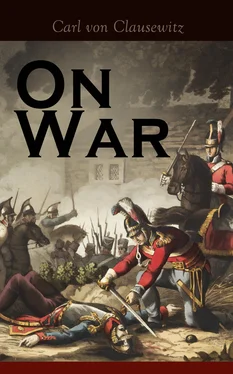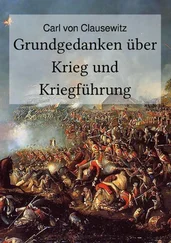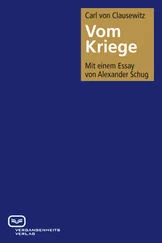It is obvious that this may sometimes lead to a wide field of inquiry, in which it is easy to wander and lose the way, and in which this difficulty prevails—that a number of assumptions or suppositions must be made about a variety of things which do not actually appear, but which in all probability did take place, and therefore cannot possibly be left out of consideration.
When Buonaparte, in 1797, 8at the head of the Army of Italy, advanced from the Tagliamento against the Archduke Charles, he did so with a view to force that General to a decisive action before the reinforcements expected from the Rhine had reached him. If we look, only at the immediate object, the means were well chosen and justified by the result, for the Archduke was so inferior in numbers that he only made a show of resistance on the Tagliamento, and when he saw his adversary so strong and resolute, yielded ground, and left open the passages, of the Norican Alps. Now to what use could Buonaparte turn this fortunate event? To penetrate into the heart of the Austrian empire itself, to facilitate the advance of the Rhine Armies under Moreau and Hoche, and open communication with them? This was the view taken by Buonaparte, and from this point of view he was right. But now, if criticism places itself at a higher point of view—namely, that of the French Directory, which body could see and know that the Armies on the Rhine could not commence the campaign for six weeks, then the advance of Buonaparte over the Norican Alps can only be regarded as an extremely hazardous measure; for if the Austrians had drawn largely on their Rhine Armies to reinforce their Army in Styria, so as to enable the Archduke to fall upon the Army of Italy, not only would that Army have been routed, but the whole campaign lost. This consideration, which attracted the serious attention of Buonaparte at Villach, no doubt induced him to sign the armistice of Leoben with so much readiness.
If criticism takes a still higher position, and if it knows that the Austrians had no reserves between the Army of the Archduke Charles and Vienna, then we see that Vienna became threatened by the advance of the Army of Italy.
Supposing that Buonaparte knew that the capital was thus uncovered, and knew that he still retained the same superiority in numbers over the Archduke as he had in Styria, then his advance against the heart of the Austrian States was no longer without purpose, and its value depended on the value which the Austrians might place on preserving their capital. If that was so great that, rather than lose it, they would accept the conditions of peace which Buonaparte was ready to offer them, it became an object of the first importance to threaten Vienna. If Buonaparte had any reason to know this, then criticism may stop there, but if this point was only problematical, then criticism must take a still higher position, and ask what would have followed if the Austrians had resolved to abandon Vienna and retire farther into the vast dominions still left to them. But it is easy to see that this question cannot be answered without bringing into the consideration the probable movements of the Rhine Armies on both sides. Through the decided superiority of numbers on the side of the French—130,000 to 80,000—there could be little doubt of the result; but then next arises the question, What use would the Directory make of a victory; whether they would follow up their success to the opposite frontiers of the Austrian monarchy, therefore to the complete breaking up or overthrow of that power, or whether they would be satisfied with the conquest of a considerable portion to serve as a security for peace? The probable result in each case must be estimated, in order to come to a conclusion as to the probable determination of the Directory. Supposing the result of these considerations to be that the French forces were much too weak for the complete subjugation of the Austrian monarchy, so that the attempt might completely reverse the respective positions of the contending Armies, and that even the conquest and occupation of a considerable district of country would place the French Army in strategic relations to which they were not equal, then that result must naturally influence the estimate of the position of the Army of Italy, and compel it to lower its expectations. And this, it was no doubt which influenced Buonaparte, although fully aware of the helpless condition of the Archduke, still to sign the peace of Campo Formio, which imposed no greater sacrifices on the Austrians than the loss of provinces which, even if the campaign took the most favourable turn for them, they could not have reconquered. But the French could not have reckoned on even the moderate treaty of Campo Formio, and therefore it could not have been their object in making their bold advance if two considerations had not presented themselves to their view, the first of which consisted in the question, what degree of value the Austrians would attach to each of the above-mentioned results; whether, notwithstanding the probability of a satisfactory result in either of these cases, would it be worth while to make the sacrifices inseparable from a continuance of the War, when they could be spared those sacrifices by a peace on terms not too humiliating? The second consideration is the question whether the Austrian Government, instead of seriously weighing the possible results of a resistance pushed to extremities, would not prove completely disheartened by the impression of their present reverses.
The consideration which forms the subject of the first is no idle piece of subtle argument, but a consideration of such decidedly practical importance that it comes up whenever the plan of pushing War to the utmost extremity is mooted, and by its weight in most cases restrains the execution of such plans.
The second consideration is of equal importance, for we do not make War with an abstraction but with a reality, which we must always keep in view, and we may be sure that it was not overlooked by the bold Buonaparte—that is, that he was keenly alive to the terror which the appearance of his sword inspired. It was reliance on that which led him to Moscow. There it led him into a scrape. The terror of him had been weakened by the gigantic struggles in which he had been engaged; in the year 1797 it was still fresh, and the secret of a resistance pushed to extremities had not been discovered; nevertheless even in 1797 his boldness might have led to a negative result if, as already said, he had not with a sort of presentiment avoided it by signing the moderate peace of Campo Formio.
We must now bring these considerations to a close—they will suffice to show the wide sphere, the diversity and embarrassing nature of the subjects embraced in a critical examination carried to the fullest extent, that is, to those measures of a great and decisive class which must necessarily be included. It follows from them that besides a theoretical acquaintance with the subject, natural talent must also have a great influence on the value of critical examinations, for it rests chiefly with the latter to throw the requisite light on the interrelations of things, and to distinguish from amongst the endless connections of events those which are really essential.
But talent is also called into requisition in another way. Critical examination is not merely the appreciation of those means which have been actually employed, but also of all possible means, which therefore must be suggested in the first place—that is, must be discovered; and the use of any particular means is not fairly open to censure until a better is pointed out. Now, however small the number of possible combinations may be in most cases, still it must be admitted that to point out those which have not been used is not a mere analysis of actual things, but a spontaneous creation which cannot be prescribed, and depends on the fertility of genius.
Читать дальше












